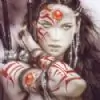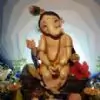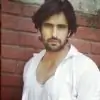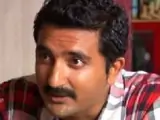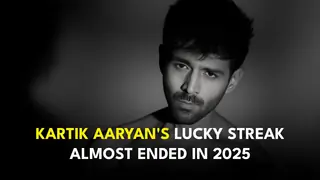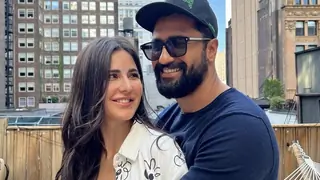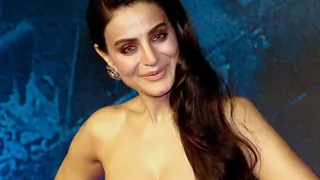Taat! Taat!
On the ninth night of the War, Arjuna reminisces his childhood days with Bheeshma.
Yudhishthara was 16 years old when Pandu died, Bhima was 12 or 14, same age as Duryodhana. There was a long gap between Arjuna and Yudhishthara. Arjuna is younger than Krishna by almost 2 years. Krishna is atleast 8-10 years younger than Yudhishthara.
So when Pandu died Arjuna was 4-6 years of age (Nakula Sahadeva do not remember the forest life at all). Playing as a child, spoiling his clothes and body with dust and dirt of childhood games, Arjuna would run into the lap of freshly bathed and clean cloth wearing Bheeshma shouting "Taat!" "Taat!". ("O My father" or "My dear father".). Bheeshma would pick up the naughty child and hug him and say "taat! I am your father's taat!". (By the way English word Dad comes from Taat!).
Arjuna was beloved of his parents, all three of them. His parents who died on his birthday while Kunti was preparing for his name day celebrations. The slokas describe the gravity and pain of the young child. Imagine the psychosis on that little child. His most anticipated day and joy turned to ashes, in a literal sense one can scarcely fathom. (Personally, I always felt that day's scars never really healed for Arjuna what with leaving to go alone for teertha yatra and later two very long spells of tapasya and two more spells of weapons training away with Agnivesha and Indra, he wanted to be away from family unit he though he might have hurt, a blame every child sometimes carries).
Bheeshma describes in earlier Parvas of young Arjuna still in shock. It is not a saying but a true hard fact that even the unintelligent birds take extra care of the weaker chick, a mother or grandmother may love all children equally but she would despite her protestations love the one who is hurt or needs the care most.
Bheeshma saw five orphaned grandsons, one a sixteen year old in control of his senses, second a robust teenager who was quick to anger and quick to love, like wind his father, the cares wash over him, he saw the little twins sleeping peacefully in Kunti's lap unaware of any tragedy that afflicted their lives and he saw the child whose parents died on his birthday. Bheeshma reached out with his love and broke through the barrier that the pain had built around the child and soothed his heart. Look at the terms and reminisces Bheeshma and Arjuna use. Bheeshma is making fun of Arjuna's speech or lack of it at one point. What 5 year old cannot speak unless he has been completely turned silent by the tragedy. Bheeshma literally re-taught him to speak, open up again and enjoy life again. We have descriptions through the entire Epic, Yudhishthara is separated by Vidura and Kripa, Bhima taken away by Vyasa, Kunti busy with twins, Dhritrashtra not able to give in to love his nephew even at that time as Sanjay again and again accuses.
(Dhritrashtra asks again and again how can Arjuna and Bhima cruelly kill his soldiers and again and again Sanjaya reminds him and asks who hurt their komala hridyas, put tears in their moon like eyes (Dhritrashtra was not the loving uncle to the little boys especially Arjuna)).
Who answered Arjuna's need for love? It was Bheeshma. It was Bheeshma who taught Arjuna to talk again that he could ask those questions from Krishna that day at Dharmakshetra.
Yesterday, my wife asked after the Starbharata episode that Krishna is called Devakinandana, so what is he called in reference to Yashoda, the answer first escaped was Nandalal.
We do forget the father Nanda. We do forget the fathers. We forget their role sometimes in shaping the outlook of the child, the ever-sacrificing Nanda who gave his daughter away and taught young Krishna the value of duty and not care for the consequences. Karmanye Vadhika raste...
Krishna could have come back to Vrindavana and spend the life in fun and games and safety and world would have needed a new avatar to get rid of Jarasandha, Naraka and Kauravas and countless others. Krishna like Nanda turned his back on his own happiness and looked out for his friend, his society and his duties to the world.
Again, we do not credit the fathers. It was not Krishna who instituted the worship of Govardhana, it was Nanda. It was a father who took a suggestion from his son, saw its merit and executed it. He changed the outlook of his people by persuading them and also empowered his son at the same time to run with more of these out of box ideas. By the way, Nanda took the decision to leave Gokula for Vrindavana when Krishna was a baby and out of concern to protect the child and it was not given as suggestion by Krishna. Vrindavana later gave taxes to Indraprastha (only mention of Nanda in Epic is as subject of Yudhishthara) meant that Nanda moved outside Kamsa's demesne.
Similarly, we forget the role and influence of Bheeshma and Drona in developing the best and more powerful warrior, world had ever seen. Unlike Nandlala, Arjuna never got the title Drauni though. It was a Deva-RAJA who birthed him, it was a Deva-VRATA who made him Arjuna. RAJA or King was his creation but VRATA or Duty, Sacrifice was his renaissance.
In that context, asking Arjuna to kill Bheeshma was horrendous and soul sapping for him. We can understand the conflict raging in his heart that ninth night.
Krishna showed the impatience twice with Arjuna vis--vis his battles against Bheeshma. I sometimes believe that like Draupadi who did not wish to share Arjuna's love, Krishna too was possessive of Arjuna. That is why he almost broke his oath twice. He felt he could not overcome the love Arjuna has for Bheeshma ever and has to do the deed himself. O Re kanhayya kisko kahega tu mayya, but Arjuna knew who to call father, the man who raised him from his private childhood hell and soothed his soul, his psyche. Maybe, Krishna was a little jealous of that. He did not have access to Nanda anymore but Arjuna's Taat was right there. Don't get me wrong, only with human foibles would God understand the pain of mortals, Rama knew of pain of separation of Sita during the tempestuous monsoon on the Pampa Sarovara.
So when a maruta by divine command
With rising tempests shakes a guilty land,
Such as of late over pale Pamapsara passed,
Calm and serene he drives the furious blast;
And, pleased the Almighty's orders to perform,
Rides in the whirlwind, and directs the storm
When clouds appear, wise men put on their cloaks;
When will great leaves fall, O when will the winter be at hand;
When the sun sets, who doth look for night? Without thee o Sita
My heart burns brighter than the sun,
Untimely storms make men expect a dearth,
The stormy thoughts cloud me in their girth,
At first, heard solemn over the verge of Heaven,
The Tempest growls; but as it nearer comes,
And rolls its awful burden on the wind,
The Lightnings flash a larger curve, and more
The Noise astounds; till overhead a sheet
Of livid flame discloses wide the dearth of Janaki, then shuts,
And opens wider; shuts and opens still, o my heart
Expansive, wrapping ether in a blaze.
Follows the loosened aggravated Roar,
was it me or Maruta who screamed
Enlarging, deepening, mingling, peal on peal,
Crushed, horrible, convulsing my Heaven and Earth
- with due apologies to Bard and James Thompson
When I saw the movie Tarein zameen pe, I pictured Bheeshma or Drona to be in the position of Amir Khan and child to be Arjuna. Indra may have given birth but it was Bheeshma and Drona who nurtured and developed his talent. In the end of that movie, they brought in Lalitha Lajmi, sister to auteur Gurudutt and a great painter whose paintings focused on mother/woman and her constant protection of child against elements, I think a silent acknowledgement of the inspiration movie "Love Mary" about Dr. Gorda-Lewis as well as role of a mentor in preparing the child reinforced by the presence of the artist known for such paintings.
Now imagine, in the sequel, Darsheel is asked to kill Amir Khan many years later. That was the burden on the soul of Arjuna. Not only with Bheeshma, with the second father figure in his life, Drona. Nakula and Sahadeva didn't have the same problem or attachment to Drona, they were so much younger than Yudhishthara that they had a ready made father figure available in Dharmaputra.
(When Yudhishthara asked for Nakula's life, maybe he was not that noble, he was asking for life of his oldest child, his first responsibility given in his still child like hands by his cruel mother Madri!).
Cruel Mother indeed! She expiated the guilt she felt at death of the patriarch by following the cruel custom of her people in the north-west at that period. Frowned upon by the Conservative Brahmin class of Kurus as an example of low cultural and dharmic tendencies of the Bahlika people, Sattee was a custom they looked down on. That what was blasphemous to Kurus in Epic age becomes the worship, the paramapara in 9th century AD when other circumstances and influences appeared on the western borders, that unnatural act is a natural evolution of ideas though horrendous and unnatural in sense of morality.
Cruel Mother indeed to leave her sons without their mother's love and guidance, cruel indeed that she chose her husband over her five sons, not be her sister's support. As Madri was cruel who took following her duty (or her injured psyche/soul) over benefits of being the support, the shelter for her children's pains. She unknowingly hurt the Pandavas then. Bheeshma knowingly hurt them now. He followed his dead duty and his injured soul at his inability to interfere in the indignities heaped on Krishnaa so he requested release from Krishna. He could not look over the pain of injured psyche at his napusankta engendered by his dead duty to interfere that day of Dyuta, the day Devavrata died leaving the demonic shell of Bheeshma behind. He could not follow Vidura's advice to take sanyasa and look at the benefits of living on for his grandsons, be the shelter of advise for the coming generations, be the immortal beacon of experience, dharma and knowledge. He chose death and he chose his favorite grandson, the injured bird he rescued that many years back and knew he had given him the strength, Arjuna yet did not know he possessed, to execute the deed.
But his soul and the benefits of living on and be the beacon of knowledge, that did not let him die. He lived on for 58 days on that bed of arrows as life could not escape till he imparted his knowledge to his other favorite grandson, the one who made his life long tyaaga worthwhile, the reason he gave the oath to Satyavati all that time back. His conversation to Yudhishthara was 36 times longer than the Geeta. Only regret, Dharmaraja would have had was to have taken a Sarvatobhadra with him to sit on while discussing that amazing mine of information. And that is the mine of information, the abridged minded should read.
As a last word, those among the readers, who believe that Epic heroes were the upholders of the brahamanical order and cultural traits more associated with Medieval ignorance then Epic itself; nothing can be farther from the truth, the son of fisherwoman who wrote the story showed the heroes, the sons of descendent of both Ravana and Rama (Kashi princess were descended from Kusha) are very clearly the bright saviors of society, the destroyers of dead dharma, the breakers of desertified paramaparas and protectors of the weak, the deserving, the strange and the rural. They should try and read the Santi and Anushasana Parva. Anyway, I will discuss that in detail later.
These same readers and fans of abridged books, abridged philosophies and abridged minds are also the ones who do not read the epic in any detail but comment anyway on throwaway phrases and statements and are like the so many pundits who did not, could not or would not see the wave let alone the tsunami who now appear on the television with impunity deriding their own words with same gusto as they derided him earlier.
Twenty five years ago, my generation brought in the coalition rule for a polity oppressed by large majorities and uncaring rulers and their Shouting heads of bahubalies. Voice was given to more and whispers were even heard, Shouting heads were supposedly silenced. That revolution turned to the vanavasa of Shouting heads and uncaring rulers and massive ego which dare not concede a needle point of decorum to the again oppressed.
One takes great comfort and joy in knowing that even if no single voter changed his mind from 2009 to 2014 then the 120 million new voters, the young voters, the future who would live for 120 years if they eat their veggies and do exercise regularly, the youth of India, they showed us that they saw something and chose a new way, a new idea. They chose a hard mountain to worship than the modern Ind(i)rapautra from Delhi.
And the numbers do show, many people did open their abridged minds (and removed the tolls) and bothered to look beyond the style at the substance. I would just say Draupadi forgave Dharmaraja his worst hour, his worst mistakes and he spent the rest of his life being worthy of her forgiveness. We can only give that blessing to the new dispensation, that they do that. They did'nt even need to spend the thirteenth year of Agyatvasa.



